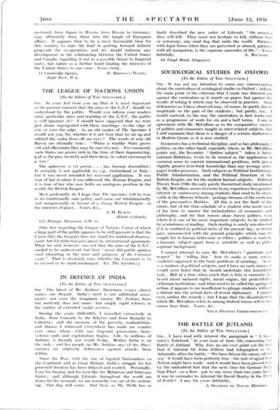SIR, —In your last issue you say that it is
most important at the present moment that the aims of the L.N.U. should be understood by the public. Would you inform your readers what particular aims and teaching of the L.N.U. the public is still ignorant of I should have supposed that we were just about impregnated with these teachings—to the edge of risk or over the edge. As an old reader of The Spectator I would ask you, Sir, whether it is not time that we sat up and rubbed the scales from off our eyes ? The words of wise old Bacon are eternally true : When a warlike State grows soft and effeminate they may be sure of a war. For commonly such States are grown rich in the time of their degenerating, aid so the prey inviteth, and their decay in valour eneourageth a war."
• The aphorism si via poem . . . has become discredited : It certainly is not applicable to, e.g., Switzerland or Italy : but it was never intended for universal application. It was true of her to whom it was addressed, the Roman Empire, and it is true of her who now holds an analogous position in the world, the British Empire.
Most profoundly do I hope that The Spectator• will be true to its traditionally sane policy, and come out wholeheartedly and unequivocally in favour of a strong British Empire—in the interests of peace.—Yours, &c., A. H. BURN E (Lieut.-Colonel).
125 Bishops ilansions, S.11'. Q.
One fact regarding the League of Nations Union of which a large part of the public appeals to be still ignorant is that the Union (like the League) does not stand for unilateral disarma- ment, but for reduction part passe by international agreement. What we said, however, was not that the aims of the L.N.U. needed to be understood, but that never did public opinion need educating in the aims and purposes of the Covenant more." That is obviously true, whether the Covenant is . to be revised or to stand unchanged.--En. The Spectator.]






















































 Previous page
Previous page